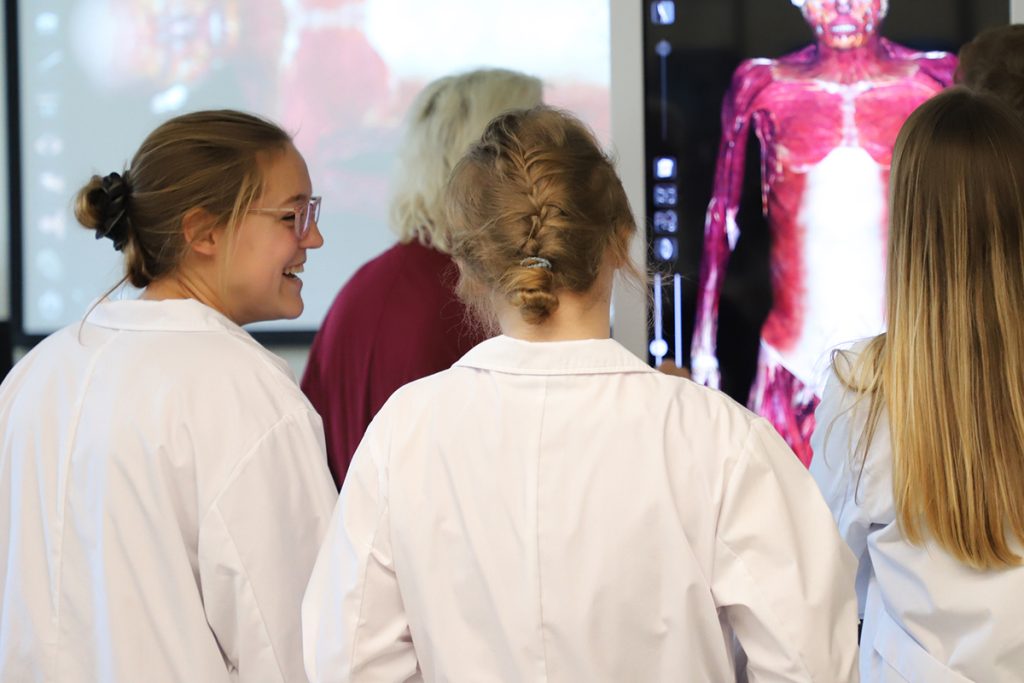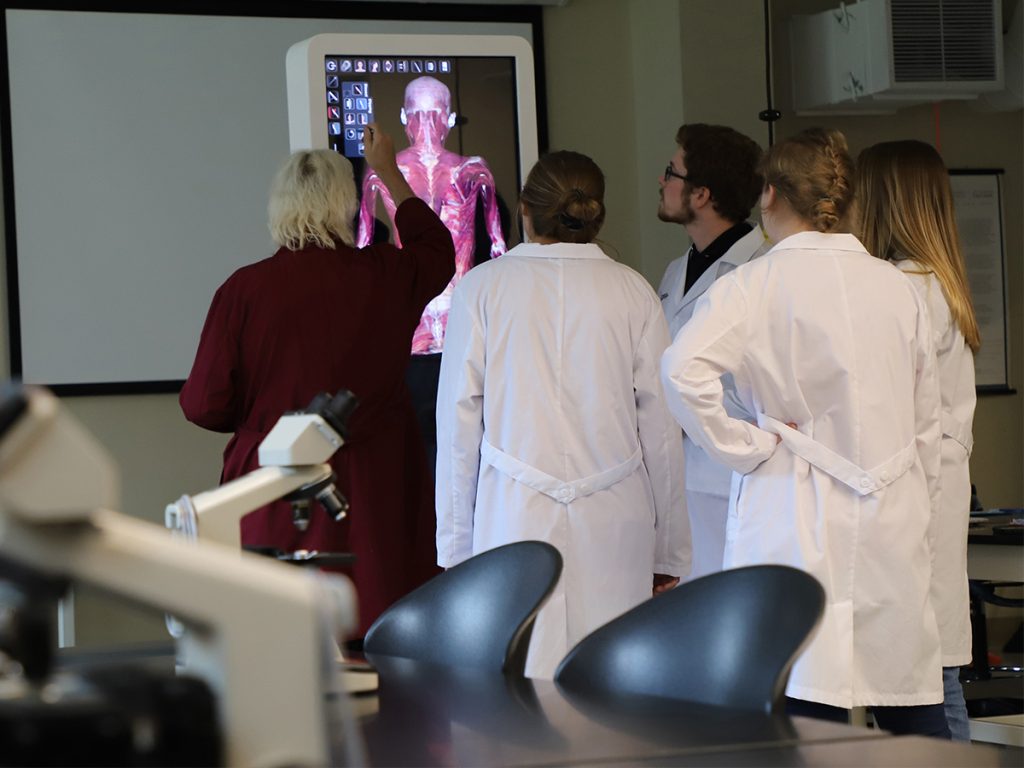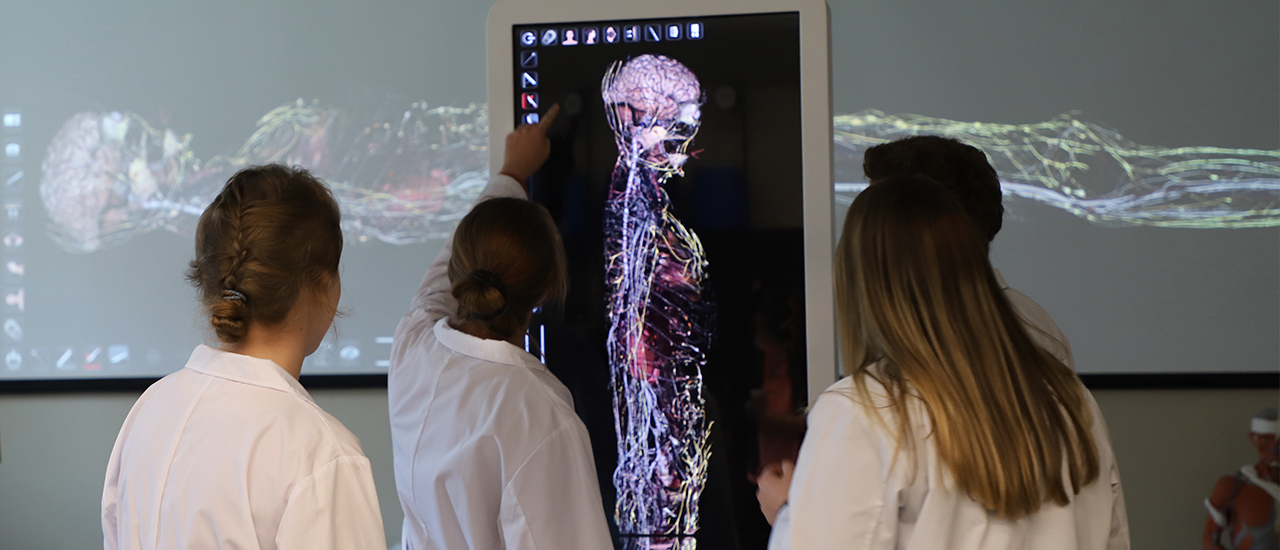Imagine having access to life-size, head-to-toe, three-dimensional veins, muscles, arteries, organs, and bones—fully dissectible and ready to explore with just the touch of a finger—all in the convenience of a digital “tablet.” While this may sound fascinating to most, for biology, nursing, and other health science majors, this could change everything.
This fall, University of Northwestern became one of only three universities in Minnesota to provide a digital human cadaver lab to students at the undergraduate level. Called the Anatomage, “the world’s first virtual dissection table” allows students to dissect and study hundreds of digital human arterial, vascular, muscular, nervous, and vein systems, as well as organs and bones—all the intricacies found within the amazing human body.
Engaging and Accessible
Biology and health science pathways can be some of the most demanding and intensive areas of study for undergraduates. Students invest countless hours studying the body, among other topics, but critical time studying actual human anatomy on cadavers can be hard to come by due to the cost and availability of specimens.
In a traditional lab setting, human cadavers can cost an upwards of $1,000 each and are limited in availability. Additionally, strict policies dictate that students can only study human cadavers under the close supervision of professors or teaching assistants, greatly reducing available time to observe and learn.
With the addition of a virtual three-dimensional cadaver table in Northwestern’s newly renovated anatomy lab, students are now able to access the virtual cadaver system 24 hours a day.
“I have 55 students in my class and every single one of them has been logging in an incredible number of hours on the cadaver lab,” says Dr. Mumaugh, Assistant Professor of Biology and Chemistry. “They’re learning more than any classes ever learned before.”

State of the Art
Northwestern is one of only three schools in the state of Minnesota that incorporates this 3D cadaver table as a part of the lab experience. The technology is also being used by an increasing number of medical schools and by well-known companies, such as 3M and Medtronic, making Northwestern students highly employable.
Besides the obvious benefits, Dr. Bruce Simat, Associate Professor of Biology, highlights that this state-of-the-art equipment gives students the ability to study different pathological cases concerning diseases and other bodily conditions. Within moments, students can call up on the screen the brain of a middle-aged women with dementia, or a heart affected by coronary disease.
Students are learning about the body anatomically and physiologically. “They can actually see every organ from every direction—and cut it in any direction, says Bruce. “We’re actually dissecting because we’re using our finger to cut.”
“When I first turned it on, I spent about five hours just learning. I just got so enthralled with it.”
Joshua Krueger ’20, UNW teaching assistant
Grace Wilson ’20, a UNW teaching assistant, speaks to the rich study tool the cadaver table is, with features that allow her to touch, see, and rotate each individual muscle and bone—including the smallest bones and muscles in the face and ear—and immediately see the name of each part displayed. Joshua Krueger ’20 agrees: “When I first turned it on, I spent about five hours just learning. It’s fairly intuitive. I just got so enthralled with it,” says.

God’s Creation on Display
“We see the magnificence of God’s creation here more than any other place on campus. We find that to be quite an honor.”
Dr. Gary Mumaugh
Besides the academic benefits of the lab, this digital lab allows students to admire God’s creation in a way that greatly impacts their faith. “I’ve noticed over the years that in the lab our faith actually grows,” says Mumaugh.
“You wouldn’t think faith would grow in a place where you see yucky human specimens, but we see the magnificence of God’s creation here more than any other place on campus. We find that to be quite an honor.”
If you’re interested in learning more about the Biology degrees available at Northwestern, or would like to see this new, state-of-the-art equipment in person, please visit unwsp.edu/admissions.

